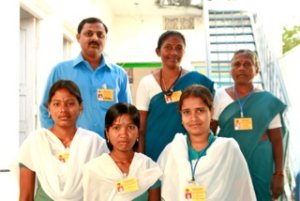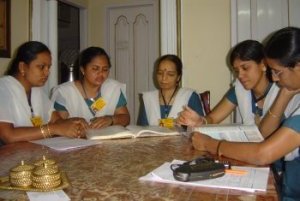|
|
| IRHS Staff | ||
|
Village Clinic Staff
|
Employing locally recruited paramedics and health workers is the only sustainable answer to providing healthcare in rural India. In
India there is a chronic shortage of doctors in rural areas. Practicing
in a rural area is seen as lacking in prestige in comparison to working
in urban medical centres. Even if we could attract qualified doctors,
their families would refuse to accompany them as conditions are so primitive.
Reduced hours of electricity, erratic water supply and limited educational
facilities for their children are some of the reasons given for refusing
rural service. Through the dedication of foreign volunteer doctors, IRHS has trained local paramedics and health workers. Our clinic staff have developed a breadth and depth of clinical knowledge that enables them to manage most of the patients who come to the clinics. The success of the village clinics is due to the people who work there. The village staff excel because they are patient centred, compassionate and professional. |

Paramedics and health workers at the IRHS Dokur clinic |
|
Cancer Nurses |
The cervical cancer screening project is run by four local Auxiliary Nurse Midwives (ANMs). Our ANMs have been trained by a specialist doctor at the Institute of Oncology (MNJ Cancer Hospital) on cervical screening methods and cryotherapy using the International Agency for Research on Cancer (IARC) manual as well as supervised hands-on experience. The same doctor has volunteered her services as an advisor since 2001 when the WHO offered IRHS a grant to begin the programme. Currently the cancer project is run from the Mahbubnagar district hospital. Since 2001 approximately 6000 patients have been screened each year. IRHS cervical cancer screening is the only such programme in India completely run by ANMs. Our ANMs are skilled and experienced at implementing the visual inspection method and have helped to save thousands of lives. |
Health workers at the cancer clinic in Mahbubnager |
| Patient Counselors | IRHS
has counsellors at both the Mahatma Gandhi bus depot and at the hospitals
in Hyderabad. They are locally recruited and guide patients through their
visit and/or admission. They make sure patients find the correct doctor
or laboratory, are not cheated, and understand their medical conditions,
prognosis and treatment options. Counsellors have cash to help cover the
patients' and careers' travel costs, food and fees for tests and admission
to hospital. After outpatient department closes, counselors proceed to hospital wards where they counsel ward patients about their conditions. They answer any questions patients or their relatives may have. If they cannot answer the question they will seek the doctor in charge in an attempt to answer that question. The patient counselors have been trained both in aspects of medicine and psychology. Indian medical doctors and psychologists take weekly classes. |
 IRHS patient counsellors are trained and skilled local people. They are trilingual and can speak to patients in English, Hindi or Telugu. |
|
Support
Staff
|
Three support staff work in the Hyderabad office: the director, a pharmacist cum financial assistant and a patient counsellor supervisor/administrator. As in all small offices, multi tasking is the norm and the support staff work closely together to maintain patient records, chronic patient lists of specialists' prescriptions, dispensing of all medicine to all programmes and, finally, finances. The staff manages all cash and bank accounts, pay taxes on rent and salaries, retirement (Provident Fund) and other expenses. All medicine is ordered and received here and is carefully maintained using a sophisticated programme designed by a volunteer from McKinsey and Company. They enter all basic financial data into Excel and ultimately enter it into the required programme preferred by Indian accountants (Tally). Thus all work of the IRHS is done 'in house'. | |
|
|
||
 |
||